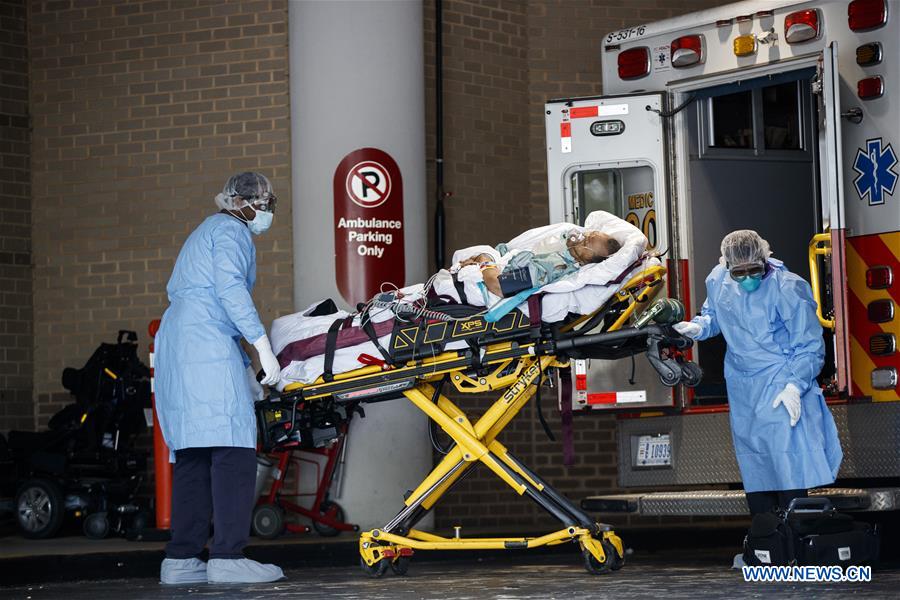Global health governance in the post-COVID-19 era
- By Jiang Shixue
 0 Comment(s)
0 Comment(s) Print
Print E-mail China.org.cn, May 1, 2020
E-mail China.org.cn, May 1, 2020

In a "TED Talk" in 2015, entrepreneur and philanthropist Bill Gates said: "When I was a kid, the disaster we worried about most was a nuclear war. [However, if] anything kills over 10 million people in the next few decades, it's most likely to be a highly infectious virus rather than a war."
"Ebola doesn't spread through the air. Next time, we might not be so lucky. You can have a virus where people feel well enough while they're infectious that they get on a plane or they go to a market."
The COVID-19 pandemic serves as a valuable if painful wake-up call for humanity. Apparently, to prevent a virus spread, the old remedy of "an apple a day keeps the doctor away" is not enough.
Domestically, the government of any country must spend more on health care and pay more attention to a possible outbreak of an epidemic or pandemic. Internationally, every country needs to join hands to promote global health governance.
In order to ensure it can be successful and fruitful, the following three actions are urgently needed.
Action 1: Strengthen international cooperation
Undoubtedly, global health governance is one type of international public goods affecting every country. A virus has no nationality. Thanks to the development of globalization and with the rapid movement of people across the globe, the tiny infectious agent causing disease can also travel easily from one place to another, making international unity vital.
Sadly, in the battle against COVID-19, the U.S. has been trying its best to find a scapegoat for its own failure to control the numbers of infections and deaths. This selfish and frivolous attitude is harmful not only to the U.S. itself, but also to global health.
Many years ago, China suggested that both nations should strive to build "a new type of relationship for the major powers" based on the principle of no conflict, no confrontation, mutual respect, and win-win cooperation. But in the American case, it fell on deaf ears.
As history has proved, one of the most important causes of the Cold War was mistrust between the two main ideological blocs. Therefore, in order to promote international cooperation to strengthen global health governance, trust is vital.
Guided by the vision of building a community with a shared future for all humanity, China is more than ready to share its good practices, conduct joint research and development of drugs and vaccines, and provide assistance to countries hit by the growing outbreak.
Action 2: Promote scientific and technological progress in medicine
From diagnosis to treatment, and from medicine to equipment, science and technology is extremely crucial. Thanks to progress in science and technology, smallpox and quite a few other diseases have disappeared.
In order to protect and save ourselves, we need to encourage research and development (R&D) in medicine and healthcare so as to produce more effective medicines and vaccines.
According to the WHO's estimate, by 2035, there will be a global deficit of about 12.9 million skilled health professionals. Science and technology can help narrow this gap. Telehealth and AI might bring patients closer to good care and treatment.
Believe it or not, although progress in science and technology might not be able to turn ultraviolet light and disinfectant, or sunlight and household cleaning products into medicine, as President Trump wishes, it will cut the cost of curing a patient. Many people complain that some advanced technologies and medicines are too expensive for billions of people around the world.
Action 3: Role of the WHO needs to be protected and upgraded
There is no global government for global governance. Therefore, the WHO should play an essential role based on its core global functions of establishing, monitoring and enforcing international norms and standards, and coordinating multiple actors towards common goals.
If the WHO is to do this, member countries should support its work, not politicalize it with groundless accusations. Again, in the current battle against COVID-19, the U.S. is making a scapegoat of the WHO and China.
The WHO's total annual budget is around $5.6 billion. By comparison, the Australian federal health budget for 2019–20 was $120 billion, and even bigger if state budgets are included.
So, the WHO needs to deal with the money issue. While some countries like China have offered more financial help since the outbreak of the current pandemic, the U.S. announced on April 14 that it is halting funding pending a review.
China supports the WHO in leading the global efforts to develop science-based and proper control and treatment and minimize cross-border infections. With other countries, it will scale up support for relevant international and regional organizations.
In conclusion, while the numbers of COVID-19 infections and deaths in the world are still on the rise, China's victory against the virus has demonstrated that, if proper measures are effectively implemented, the dark page today will be turned over, and a healthy future for humanity guaranteed by more effective global health governance.
Jiang Shixue is Senior Research Fellow of the Chinese Academy of Social Sciences and Distinguished Professor of the Shanghai University.
He is a columnist with China.org.cn. For more information please visit:
http://m.91dzs.com/opinion/jiangshixue.htm
Opinion articles reflect the views of their authors, not necessarily those of China.org.cn.
If you would like to contribute, please contact us at opinion@china.org.cn





